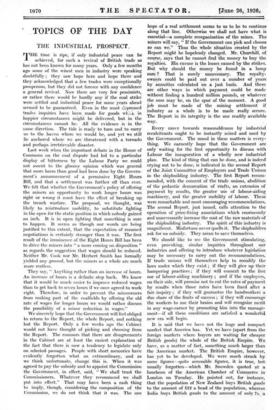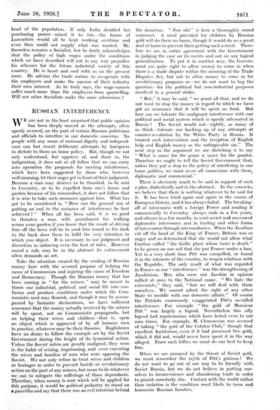TOPICS OF THE DAY
THE INDUSTRIAL PROSPECT.
THE time is ripe, if only industrial peace can be achieved, for such a revival of British trade as has not been known for many years. Only a few months ago some of the wisest men in industry were speaking doubtfully ; they saw • hope here and hope there and they acknowledged that a few trades were exceptionally prosperous, but they did not foresee with any confidence a general revival. Now there are very few pessimists, or rather there would be hardly any if the coal strike were settled and industrial peace for some years ahead seemed to be guaranteed. Even in the most depressed trades inquiries have been _made for goods whi-jc in happier circumstances might be delivered, but in the circumstances cannot be. All the evidence is in the same direction. , The tide is ready to turn and to carry us . to the haven where we would be, and yet we still lie anchored where we are. threatened with a tornado and perhaps irretrievable disaster.
Last week when the important debate in ,the House of Commons on the coal dispute had led to a particular display of bitterness by the Labour Party we could not assent to the gloomy opinion which was general that more harm than good had been done by the. Govern- ment's announcement of a permissive Eight Hours Bill, and that a settlement was further off than ever. We felt that whether the Government's policy of offering the miners an opportunity to work longer hours was right or wrong it must have the effect of breaking up the trench warfare. The proposal, we thought, was likely to reintroduce mobility, to substitute fighting in the open for the static position in which nobody gained an inch. It is in open fighting that something is sure to happen. It seems as though our words are being justified to this extent, that the expectation of resumed negotiations is certainly stronger than it was. The first result of the imminence of the Eight Hours Bill has been to drive the miners into " a more coming on disposition " as regards the suggestion that wages should be reduced. Neither Mr. Cook nor Mr. Herbert Smith has formally yielded, any ground, but the miners as a whole are much more restless.
They say, " Anything rather than an increase of hours. An increase of hours is a definite step hack. We know that it would be much easier to improve reduced wages than to get back to seven hours if we once agreed to work eight. Therefore, in order to prevent the mineowners from rushing part of the coalfields by offering the old rate of wages for longer hours we would rather discuss the possibility of a minor reduction in wages."
We sincerely hope that the Government will feel obliged to return to the Report, the whole Report, and nothing but the Report. Only a few weeks ago the Cabinet would not have thought of picking and choosing from the Report. The rumours that there are disagreements in the Cabinet are at least the easiest explanation of the fact that there is now a tendency to legislate only on selected- passages. People with short memories have evidently forgotten what an extraordinary, and as we think unfortunate, change this-. is. When it was agreed to pay the subsidy and to appoint the Commission the Government, in effect, said, " We- shall trust the Commissioners. Whatever they recommend we shall put into effect." That may have been a rash thing to imply, though, considering the composition of the Commission, we do not think that it was. The one hope of a real settlement seems to us to be to continue along that line. Otherwise we shall not have what is essential--7a complete reorganization of the mines. The miners will say, " If the Government can pick and choose so can we." Thus the whole situation created by the Report might be hopelessly changed. Mr. Churchill, of course, says that he cannot find the money to buy the royalties. His excuse is the losses caused by the strikes. But why shOuld the money be foimd in a lump sum_? That is surely unnecessary. The royalty- owners could be paid out over a number of ,years by annuities' calculated on a just basis. And there are other 'ways in which payment _ could be made without finding a hundred million pounds, or whatever: the sum may be, on the spur of the moment. A good job must be made of the mining settlement if industry as a whole is to be made really. secure. The Report in its integrity is the one readily available way. . ; Every move towards reasonableness by industrial recalcitrants ought to be instantly seized and used by the Government. The mood in these matters is every-- thing. We earnestly hope that the Government are only' waiting for the first opportunity to discuss with Labour the inauguration of a wholly new industrial plan. The kind of thing that can be done, and is indeed crying out to be done, is indicated in the second ItepOit of the Joint Cornmittee of Employers and Trade 'Unions in the shipbuilding industry. The first Report recom. mended, 'with the -consent' of the trade lurking, abolition of the pedantic dernarcation of crafts, an -extension of payment by results, the greater use of labour-aiding machinery; 'and' the -greater mobility Of labour.- Thege were remarkable and most encouraging recommendations. The second Report, just issued, calls attention to the operation. of price-fixing associations which enormously and unnecessarily increase the cost of the raw materials of the shipbuilding industit. The spirit Of this industry is magnificent. -MiSfOrtune never quells it. The §hipbuilder§ ask for .no. subsidy. They mean to saVetheinselVes.
We should like to see the Government stimulating, even provoking, similar inquiries throughout our industries and offering to introduce whatever legiSlation may be necessary to carry out the recommendations. If trade unions will themselves help to reeedify the laws under which they exist ; if they will giVe up their hampering practices ; if they will consent to the free use .of labour-aiding machinery ; and if the eMployers, on their side, will promise not to ea-the rates o, f payment by resulti when those rates haVe been fixed after the . . fair -inquiry ; if they will guarantee the. handworkers a due Share of the fruitS of success ; if they will encourage the workers to use their brains and Will recognize merit merit in any wage-earner by promoting. hiM into the manage- meat—if all these conditions are satisfied a wonderfUl new era will begin.
It is said that we have not the huge and Compact market that America has. Yet ,we have (apart from the foreign markets where buyers are waiting for -cheaper British goods) the whole of the British Empire. We have, . as a matter of fact, .something much larger than the American market. The British Empire, however,. has yet to be developed. We were much struck by.- some figures—quite accessible figures, it - is true, but-- usually forgotten—which Mr. Snowden quoted at a luncheon of the American Chamber of Commerce London on Tuesday. He pointed out, for instance, that the. population of New Zealand buys British goods to the amount of £12 a head of the population, whereas India buys British goods to the amount of only 7s. a head of the population. If only India doubled her purchasing power—raised it to 14s.—the looms of Lancashire would all be kept working overtime and even then could not supply what was wanted. Mr. Snowden remains a Socialist, but he freely acknowledges that the policy of high wages under the conditions which we have described will not in any way prejudice his schemes for the future industrial society of this country. He is heart and soul with us on the present issue. He advises the trade unions to co-operate with the emplOyers and make the success of their industry their own interest. As he truly says, the wage-earners suffer much more than the employers from quarrelling. Will not other Socialists make the same admissions ?











































 Previous page
Previous page